1/72 Canso A.
This is the Academy PBY-5A finished as a RCAF Canso A. The Canso was a license built Catalina manufactured by Boeing Canada and Canadian Vickers. The one I chose to model was a Canadian Vickers built machine from the last production batch and represents a typical Canso in late 1944 and 1945. My interest in this subject started with a decal set. I came across the excellent Aviaeology Canso package last year. This is a truly comprehensive set that includes a multi page reference booklet that goes into great detail about the various Canso models produced. It's one of those projects that the more you research, the more you realize that your assumptions are wrong. Aviaeology really produced a comprehensive product.
The main items required to turn an Academy PBY-5A into a Canso are as follows:
1.) Remove the air intake at the base of the kit's fin.
2.) Decide which Canso flak suppression set up you want. The RCAF modified these planes with fixed forward firing .303s in the bombardiers position. Some had two, the final batch of aircraft had four, along with the Ryan “eyeball” turret. I used Brengun resin .303s for this.
3.) Obtain the appropriate yagi antennas for your plane. I found an ancient Eduard PE set of these and used the wing and fuselage arrays. My plane didn't require the smaller fuselage mounted antennas.
4.) Waist guns under the blisters. Cansos had twin .303s in these positions. I again used Brengun resin items to replace the kit's single .50 Cals. Unfortunately, you can't see them very well under the closed blisters, but I know they're there!
5.) Underwing armament. I replaced the kit's American bombs with Eduard 250lb. British depth charges.
6.) Rear strike camera. I scratch built one from sheet and tube. Cansos had a mount in the rear gun tunnel that could accept either American or British cameras. A 162 Sq. Canso provided the Allies with the first photos of U-boat snorkel gear from a boat caught on the surface.
7.) You need an ADF football on top of the wing center section. The kit doesn't provide one. Mine came from the spares box and was originally from a Hasegawa 1/48 P-40K.
Another point I found interesting about these planes involved the de-icing boots. Some were completely bare rubber, others were covered with “anti conspicuity coating”(white paint), and others were in various degrees of deteriorated white white. All of these conditions could be found on the same plane, as my model demonstrates.
Another odd and unexplained feature of these planes is that the fuselage roundels and codes are offset from eachother.
162 Squadron formed in Canada and traveled to Maydown, N. Ireland for Coastal Command's anti-sub course. The squadron flew operationally from Wick, Scotland and Reykjavik, Iceland. They compiled an impressive record of destroyed and damaged U-boats during their time at war.
I painted the model with Tamiya white lacquer and Humbrol enamels for everything else. This one was a real learning experience and a satisfying project. Aviaeology products are highly recommended.
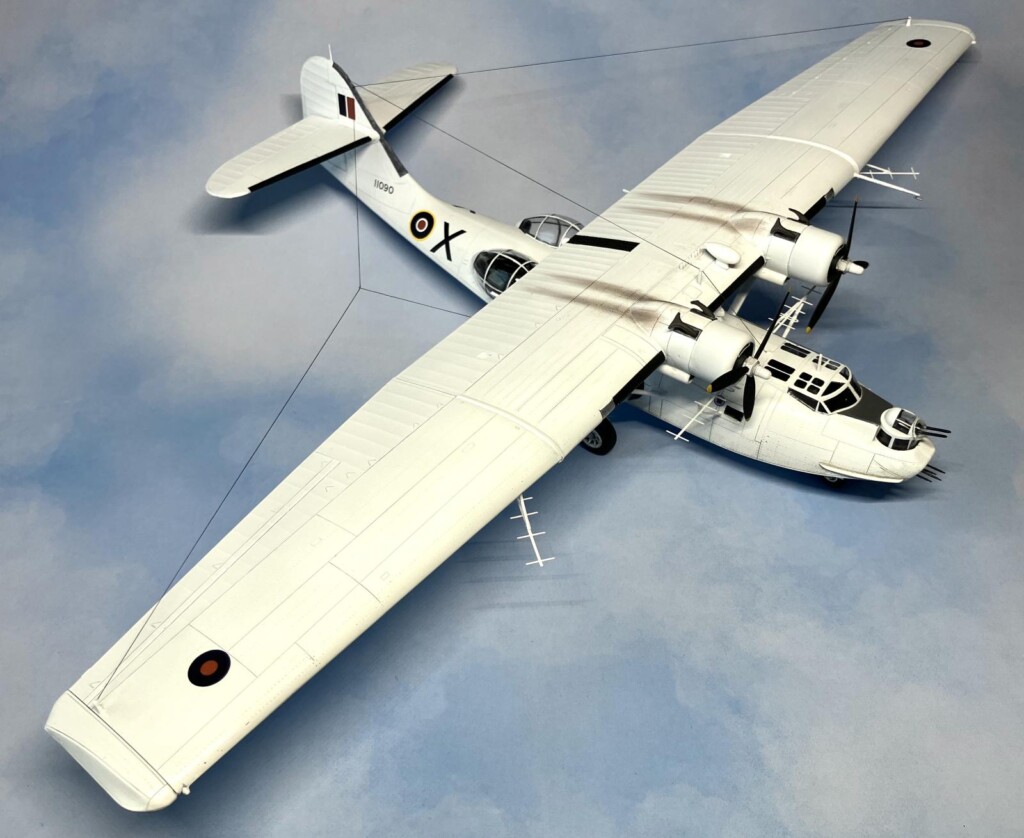
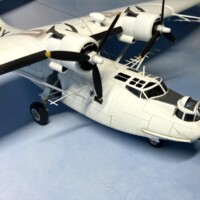
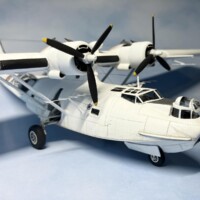
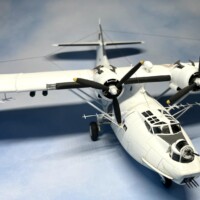
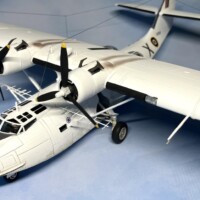
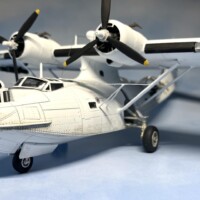
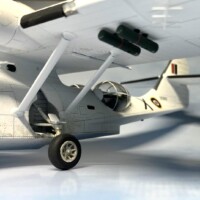
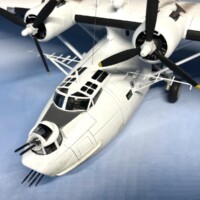
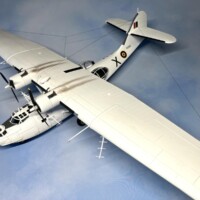
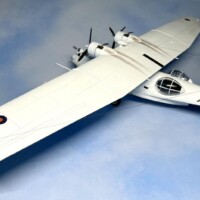
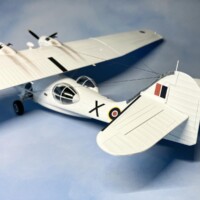
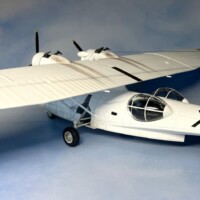
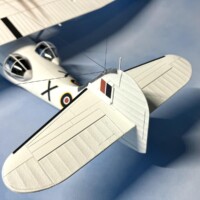
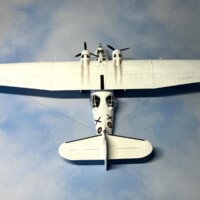
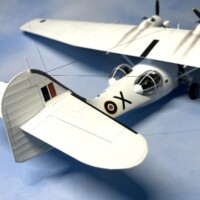
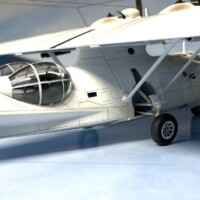
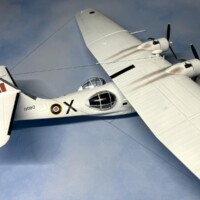
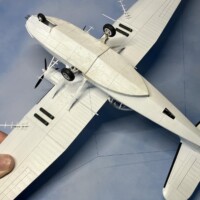
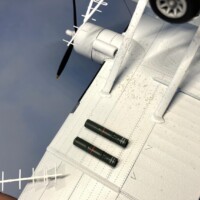
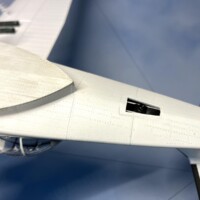
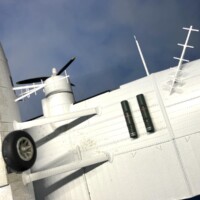
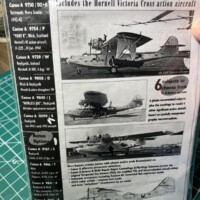
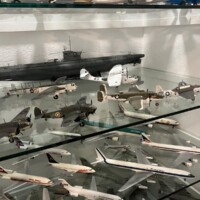
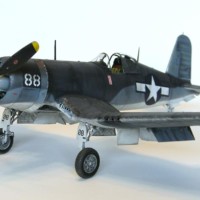
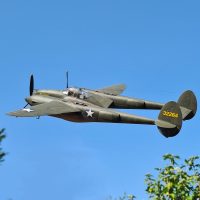
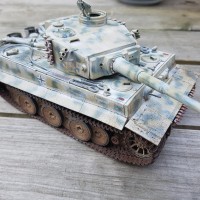
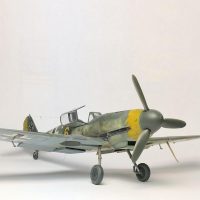
A very striking and unique bird (@j-healy). You were rewarded with a great result.
Thanks, John.
Awesome job, John! Excellent research and ditto writeup! Loved how you rendered all the modifications needed to turn a Catalina to a Canso. Regarding the asymmetric insignia placement, Polish planes during WWII at cases exhibited this feature, in order (at lest in theory) to distract the enemy from shooting. This might be the case here?
Congratulations on yet another excellent model!
Thank you, Spiros.
Very nice PBY. Never seen a Canso built before. That’s a nice looking display of aircraft and the U-boat.
Thanks, Jay.
Great cat! I've always thought they were a cool airplane. You've built yourself an awesome addition to your collection John. It would nice if other decal manufacturers included information and references photos like Aviaeology has done. I need to check them out.
Thanks, Clint. Check out their website. They focus on Canadian subjects and seem to sell out pretty fast.
Excellent result, John @j-healy
Thanks for sharing this information tp convert the Catalina into a Canso, never knew Canada did build this aircraft in license.
Thanks, John.
Sorry John @j-healy. My mistake, ofcourse I meant Canada. Corrected it in my comment.
Interesting article and great looking model, John. It must take up a lot of space in your display cabinet.
Thanks, George. Those wings sure are long. I still have room on that shelf for a Wellington and a PB4Y-1.
John Healy (@j-healy)
This is a very interesting model. Judging by the last picture, you are going to need another Atlantic ASW shelf !
Here's a photo I found several years ago of a Kingfisher that ran into another one that was moored nearby at NAS Banana River, which is now part of the Space Center. These planes were painted in the Gray / White Atlantic ASW scheme. Somewhere I have another cool wartime era color photo of a small flight of 8 or more SBD's all wearing similar paint schemes.
You don't realize just how big these PBY's were until you get in one...
I'll see if I can dig up the Dauntless photos for you.
That didn’t take long.
I definitely clicked on the "like" buttons.
If I can grab another PV-1 in 1/48 scale then I’ll be building it up with the ASW II scheme. These are great looking planes that you have built and have on display.
Would be great if a contemporary company could come up with a good/accurate rendition of the Kingfisher. I would be all in. Thanks for posting these pictures.
Thanks, Louis. They are big. Thanks for the pics too, all interesting! I’d like to do them all at some point. George Blair recently did a nice 1/48 Kingfisher in the gray/white scheme. What’s really missing in 1/72 is a good Swordfish II. I’m pretty sure Airfix only released their new tool kit in Mk.I form.
Nice work, @j-healy. I finally learned what all distinguished a Canso from a Catalina past the address of the factory. A very good result.
Thanks, Tom. Yes, I never realized all the detail differences between these planes either. Once I started reading their story, I went down the rabbit hole!
Nicely done John, your U boat shelf keeps expanding, looking good.
Thanks, Allan. I can fit a Wellington and PB4Y-1 on it still. Now if I ever get a Sunderland I’ll be in trouble, LOL. As an experienced 1/72 guy, do you know of a decent Swordfish Mk.II? That’s my real missing link for the U-boat shelf. Airfix only did the Mk.I, right?
An old Airfix Mk 2, Revell Mk 1,3, what are the differences ?
Metal skin lower wings and armament mostly. I think the Matchbox/Revell is a Mk. 3 with a covered center crew station. I forgot that old Airfix was a Mk II. Built one 50+ years ago. Might try to hunt one down. Thanks for the response.
Looks great, and thanks for the history. Who doesn't love a Cat/Canso?
Thanks, Greg.
Great work, John. Your write-up and model are interesting, loved reviewing your post!
Thanks, Joe.
Beautiful work on this! Love the subject and scheme you chose. Smashing like button now
Thanks, David.
That is one great looking build, John. Well done!
Thanks Gary.
Excellent build John.
Thanks, Rafi.
Nice job on that Canso conversion. Looks like you have a nice ASW collection!
Thanks, Chas. It all started with an impulse buy of the big Revell u-boat!
This is a very stunning rendition of the CATALINA / CANSO John !
Overall good work.
Thank you, Sir.
Hello, very well done. I really like it and it really stands out on the shelf.
Thanks, Milan!
That's a real beauty! Love the conversion work, the scheme, and the weathering. Well done.
Thanks, Greg!